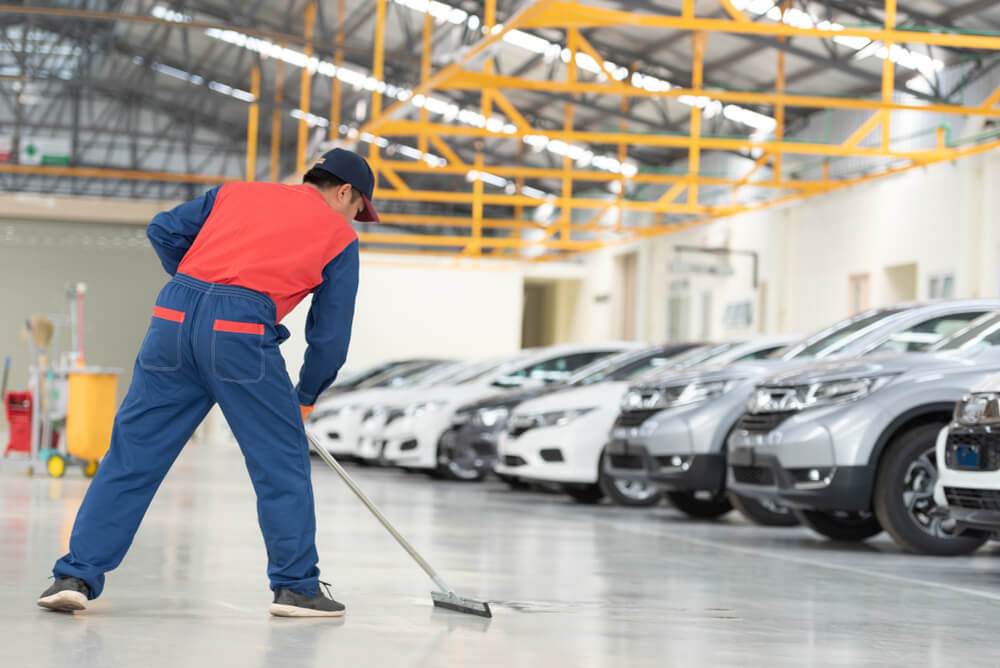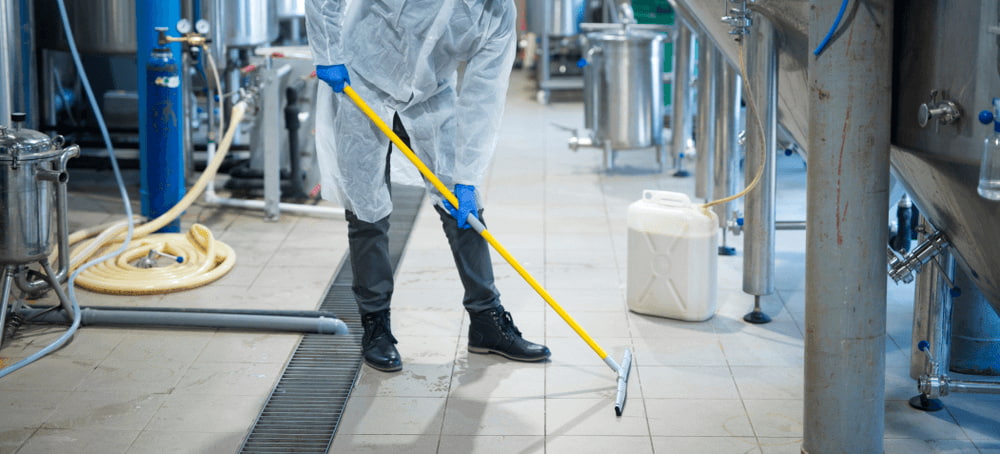In any business, maintaining a clean and safe environment is crucial. However, for industrial spaces, this goes beyond just keeping things tidy. Industrial cleaning involves specialized services designed to tackle the unique challenges presented by factories, warehouses, manufacturing plants, and other large-scale operations.
Whether you run a chemical processing facility, a food production plant, or a manufacturing site, industrial cleaning services can play a pivotal role in ensuring compliance with safety regulations, minimizing health hazards, and promoting productivity.
In this article, we’ll explore what industrial cleaning entails, the types of industries that require these services, and what businesses can expect when hiring industrial cleaning professionals.
From understanding the protocols followed in industrial spaces to the safety regulations that must be adhered to, you’ll gain insight into why hiring professional cleaning services is not just beneficial—it’s essential.
Why Industrial Cleaning is Different
Unlike regular office or commercial cleaning, industrial cleaning demands specialized knowledge, equipment, and processes. Industrial facilities typically deal with a combination of heavy machinery, hazardous materials, and high-traffic areas.
Standard cleaning methods just won’t cut it here. Industrial cleaning professionals are trained to handle unique challenges such as toxic chemicals, biohazards, grease buildup, and industrial waste, while ensuring minimal disruption to operations.
Types of Industries That Need Industrial Cleaning
Not every business requires industrial cleaning services, but for those that do, these services are a vital part of maintaining a safe and compliant workspace. Here are some industries where industrial cleaning is crucial:
1. Manufacturing and Production Plants
Manufacturing facilities often deal with large machinery, oil, grease, and heavy dirt that accumulates over time. Industrial cleaners ensure that machinery is properly cleaned and maintained, preventing malfunctions and improving efficiency.
2. Warehouses and Distribution Centers
Large storage areas that process high volumes of goods require regular cleaning to prevent dust buildup, remove debris, and ensure safe walking surfaces. Forklifts, loading docks, and packing areas are particularly high-traffic zones that require special attention.
3. Food Processing Plants
Cleanliness is essential in food production facilities. These spaces must adhere to strict hygiene standards to prevent contamination. Industrial cleaning services often involve deep cleaning of equipment, floors, and surfaces to maintain compliance with food safety standards.
4. Chemical and Pharmaceutical Plants
Chemical and pharmaceutical industries often deal with hazardous substances that require specialized cleaning protocols. Industrial cleaners are trained to manage and dispose of chemicals safely, ensuring that the facility adheres to safety regulations.
5. Automotive and Aerospace Facilities
In these industries, proper cleaning extends the lifespan of machinery and ensures a safe working environment. Industrial cleaning includes degreasing parts, cleaning floors, and maintaining ventilation systems to control dust and fumes.
Cleaning Protocols for Industrial Spaces

The complexity of industrial environments demands customized cleaning protocols tailored to the specific needs of the business. Here’s what businesses can expect in terms of cleaning procedures:
1. Initial Assessment and Planning
Before any cleaning takes place, industrial cleaning services typically begin with a comprehensive site assessment. This helps the cleaning team identify high-risk areas, evaluate what kind of equipment and products will be needed, and outline the safety procedures to follow.
2. High-Pressure Cleaning for Machinery and Equipment
Industrial machinery often accumulates grease, grime, and debris that can impair its function over time. High-pressure cleaning methods, such as power washing or steam cleaning, are used to effectively remove these contaminants without damaging the machinery.
3. Ventilation and Air Duct Cleaning
In large industrial spaces, ventilation systems can quickly become clogged with dust, debris, or hazardous chemicals. Regular cleaning of air ducts and ventilation is crucial to maintaining good indoor air quality and preventing the circulation of harmful particles.
4. Waste Disposal and Hazardous Material Handling
Industrial cleaning often involves dealing with hazardous materials like chemicals, oils, or other toxic substances. The cleaning team will follow strict waste disposal protocols to ensure that these substances are safely removed from the site, following local regulations and environmental guidelines.
5. Floor and Surface Cleaning
The floors of industrial spaces can accumulate oil spills, grease, and heavy dirt. Professional cleaning services use heavy-duty equipment such as industrial scrubbers and degreasers to ensure that floors are spotless and safe for walking, reducing the risk of slips and falls.
Safety Regulations and Compliance in Industrial Cleaning
Safety is non-negotiable in industrial settings. One of the biggest advantages of hiring professional industrial cleaners is their understanding of and adherence to safety regulations. Let’s look at how safety and compliance play into industrial cleaning practices:
1. OSHA Compliance
The Occupational Safety and Health Administration (OSHA) sets forth regulations for workplace safety, and industrial cleaning professionals are trained to follow these guidelines meticulously.
This includes everything from using proper personal protective equipment (PPE) to ensuring that hazardous materials are handled according to legal standards.
2. Preventing Accidents and Injuries
Industrial cleaning can be hazardous if not performed correctly. Cleaning professionals are trained to identify potential safety risks, such as slippery surfaces or improperly stored chemicals, and mitigate these risks to prevent accidents or injuries.
3. Adherence to Industry-Specific Regulations
Certain industries, such as food processing or pharmaceuticals, have additional safety and cleanliness standards set by regulatory bodies like the Food and Drug Administration (FDA) or the Environmental Protection Agency (EPA).
Industrial cleaning services are well-versed in these regulations and work to ensure that facilities maintain compliance.
4. Environmental Compliance
Industrial cleaning often involves the removal of hazardous materials, so it’s crucial to adhere to environmental standards. Professional cleaning services are responsible for properly disposing of toxic waste, preventing contamination, and following all environmental laws.
Common Industrial Cleaning Products and Equipment
What products and tools do industrial cleaners use? The equipment and cleaning solutions used in industrial spaces are often more robust than those used in commercial office cleaning. Here’s a breakdown of some of the most commonly used products and equipment:
1. Heavy-Duty Degreasers
In manufacturing plants and automotive facilities, oil and grease buildup is a constant problem. Industrial cleaners use strong degreasers to break down tough oil stains and residues on machinery, floors, and surfaces.
2. Industrial Scrubbers and Sweepers
For large floor areas in warehouses or factories, industrial-grade scrubbers and sweepers are essential. These machines cover large spaces quickly and efficiently, ensuring thorough cleaning in less time.
3. Power Washers
High-pressure power washers are often used to clean machinery, walls, and external surfaces. The pressure from these machines removes stubborn grime and dirt that accumulates over time, particularly in outdoor areas or high-use machinery.
4. Disinfectants and Sanitizers
In environments such as food processing or pharmaceutical plants, it’s critical to use powerful disinfectants to kill bacteria and prevent contamination. Eco-friendly, food-safe disinfectants are often employed in these sensitive areas to ensure both cleanliness and compliance with safety standards.
5. Air Filtration Systems
When cleaning areas with poor air quality or hazardous airborne particles, industrial cleaners may use specialized air filtration systems to purify the air. This is especially important in chemical or pharmaceutical environments, where toxic fumes may be present.
The Benefits of Hiring Professional Industrial Cleaning Services
Hiring an industrial cleaning service can offer several advantages beyond simply keeping your facility clean. Here’s why it’s a smart investment for any business operating in an industrial space:
1. Enhanced Productivity
A clean work environment contributes to higher productivity levels. Clean, well-maintained machinery runs more efficiently, and workers are less likely to fall ill due to exposure to hazardous materials, dust, or other contaminants.
2. Reduced Risk of Accidents
A professionally cleaned facility is less prone to accidents like slips, falls, or equipment malfunctions due to dirt buildup. Industrial cleaning services help ensure that all safety standards are met, reducing the risk of workplace injuries.
3. Improved Equipment Lifespan
Regular cleaning and maintenance of machinery can help extend its lifespan, saving your business from costly repairs or replacements. Clean equipment runs more smoothly, which means fewer disruptions to your operations.
4. Healthier Work Environment
Removing dust, contaminants, and hazardous materials from industrial spaces helps to create a healthier work environment for employees. This can reduce absenteeism and improve overall morale, as employees feel safer and more comfortable in their workspace.
5. Compliance with Health and Safety Regulations
By working with professional industrial cleaners, you can rest assured that your facility will remain compliant with all relevant health and safety regulations. This not only helps you avoid costly fines but also boosts your reputation as a responsible and compliant business.
Conclusion
Industrial cleaning is an essential service for businesses operating in manufacturing plants, warehouses, food processing facilities, and more. The complexity and risks involved in these environments make professional cleaning a must.
From adhering to safety regulations to using specialized equipment, industrial cleaners provide the expertise and tools needed to keep these spaces clean, safe, and compliant.
Hiring a professional cleaning service is not just about keeping your industrial facility looking neat; it’s about ensuring the safety and well-being of your employees, protecting your machinery, and adhering to regulatory standards.
A clean and safe industrial environment leads to improved productivity, a healthier workforce, and fewer accidents—factors that can significantly impact the success of your business.
FAQs
-
What types of businesses need industrial cleaning services?
Industries such as manufacturing, warehousing, food processing, chemical plants, and automotive facilities typically require industrial cleaning services due to the unique challenges they present, such as hazardous materials, heavy machinery, and large-scale operations.
-
What products are used in industrial cleaning?
Industrial cleaning services use heavy-duty degreasers, industrial scrubbers, power washers, disinfectants, and sometimes specialized air filtration systems, depending on the needs of the facility.
-
How often should industrial spaces be cleaned?
The frequency of industrial cleaning depends on the type of business, the amount of traffic, and the level of hazardous materials present. While some areas may need daily cleaning, others may only require monthly or quarterly deep cleaning.
-
What are the safety regulations for industrial cleaning?
Industrial cleaning must comply with regulations set by OSHA, EPA, FDA, and other industry-specific guidelines. Cleaners must follow protocols for handling hazardous materials, proper disposal of waste, and ensuring the safety of workers.
-
What are the benefits of hiring professional industrial cleaners?
Professional cleaners help ensure compliance with safety regulations, improve equipment efficiency, reduce the risk of workplace accidents, and create a healthier environment for workers, ultimately contributing to the overall productivity of the business.

